| •
|
Use fender covers to avoid damaging
painted surfaces. |
| •
|
To avoid damage, unplug the wiring
connectors carefully while holding the connector
portion. | |
| •
|
Mark all wiring and hoses to avoid
misconnection. |
| •
|
For release the fuel system pressure
before remove the engine assembly, start the engine without
fuel pump relay. And then turn off the ignition switch after
engine stops.
| |
| 1. |
Remove the engine
cover. |
| 2. |
Disconnect the battery negative
terminal. |
| 3. |
Remove the air duct and air cleaner
assembly.
(Refer to Intake and Exhaust System - "Air
Cleaner") |
| 4. |
Disconnect the mounting bracket and then
remove the battery.
(Refer to Engine Electrical System -
"Battery") |
| 5. |
Disconnect the ECM connector and then remove
the battery tray.
(Refer to Engine Electrical System -
"Battery") |
| 6. |
Remove the battery tray.
(Refer to Engine Electrical System -
"Battery") |
| 7. |
Remove the engineroom under
cover. |
| 8. |
Loosen the drain plug and drain the coolant.
Open the radiator cap to make rapid draining.
(Refer to Cooling System -
"Coolant") |
| 9. |
Remove the radiator upper hose and lower
hose.
(Refer to Cooling System - Radiator
Hose") |
| 10. |
Remove the intercooler inlet and outlet
hose.
(Refer to Intake and Exhaust System -
"Intercooler Pipe and Hose") |
| 11. |
Recover the refrigerant and then remove the
high pressure pipe and low pressure pipe.
(Refer to Heating, Ventilation Air
conditioning -"Compressor") |
| 12. |
Disconnet the wiring connector and cable from
trasaxle.
(Refer to Automatic Transaxle System -
"Automatic Transaxle") |
| 13. |
Remove the ATF cooler hose.
(Refer to Automatic Transaxle System -
"Automatic Transaxle") |
| 14. |
Remove the heater hose(A) and booster vacuum
hose (B).
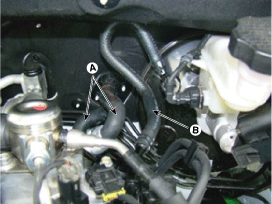
|
| 15. |
Disconnect the fuel hose(A) and PCSV(Purge
control solenoid valve)(B).

|
| 16. |
Disconnect the ground cable (A).
|
| 17. |
Disconnect the engine wiring connector and
haness clamp and then remove the cylinder head protector and wiring
from engine.
| A. |
Turbo charger solenoid valve
connector |
| B. |
Exhuast OCV(Oil Control Valve)
connector |
| C. |
Ignition connector #
1,2,3,4 |
| D. |
FPCV(Fuel Pressure Control Valve)
connector |
| F. |
Exhuast CMPS(Cam position Sensor)
connector |
| G. |
Intake CMPS(Cam Positoin Sensor)
connector
|
| H. |
Injector Extension
connector |
| I. |
PCSV(Purge Control Solenoid Valve)
connector |
| J. |
Intake OCV(Oil Control Valve)
connector |
| L. |
A/C compressor switch
connector |
| M. |
MAPS (Map Sensor)
connector |
| N. |
Knock Sensor
connector |
| P. |
CKPS(Crank Shaft Position Sensor)
connector |
| Q. |
vacuum Pump Extension
connector |
| R. |
ETC(Electric Throttle Control) Module
connector

|
| S. |
WTS(Water Temperature Sensor)
connector |
| U. |
Front Oxygen Sensor
connector |
| V. |
Rear Oxygen Sensor
connector
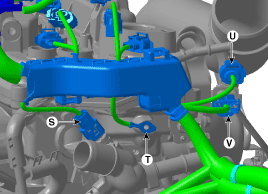
| |
| 18. |
Disconnect the (+) cable(A) from fuse
box.
Tightening
torque
Nut (A) :
6.9 ~ 10.8 N.m (0.7 ~ 1.1 kgf.m, 5.1 ~
8.0 lb-ft)
|

|
| 19. |
Remove the catalytic convertor.
(Refer to Intake and Exhaust System -
"Muffler") |
| 20. |
Remove the steering U-joint bolt.
(Refer to Suspension System - "Steering Gear
Box") |
| 21. |
Remove the front tire.
|
| 22. |
Remove the lower arms.
(Refer to Suspension System - "Front Lower
Arm") |
| 23. |
Remove the stabilizer links with the front
strut assembly after loosening the nut.
(Refer to Steering System - "Steering Gear
Box") |
| 24. |
Loosen the nut and then remove the tie-rod end
with the front axle.
(Refer to Steering System - "Steering Gear
Box") |
| 25. |
Remove the drive shaft assemble.
(Refer to Driveshaft and axle - "Front
Driveshaft") |
| 26. |
Remove the roll rod bracket.
(Refer to Engine And Transaxle Assembly -
"Engine Mounting") |
| 27. |
Remove the roll rod support
bracket.
(Refer to Engine And Transaxle Assembly -
"Engine Mounting") |
| 28. |
Support the sub frame with a floor jack and
then remove the sub frame mounting bolts and nuts.
(Refer to Suspention System - "Sub
frame")
| •
|
After removing the engine and
transaxle mounting bolts and nuts, the engine and
transaxle assembly may be fallen downward. Support them
securely with floor
jack. |
| •
|
Verify that the hoses and
connectors are disconnected before removing the engine
and transaxle assembly.
| | |
| 29. |
Using a floor jack, support the engine and
transaxle assembly. |
| 30. |
Disconnect the ground cable, and then remove
the engine suppert mounting bracket.
(Engine and Transaxle Assembly - "Engine
Mounting") |
| 31. |
Disconnect the ground (A), and then remove the
transmission mounting bracket bolts.
(Refer to Automatic Transaxle System -
"Automatic Transaxle") |
| 32. |
Remove the engine and transaxle assembly(A) in
the forward direction from the vehicle.
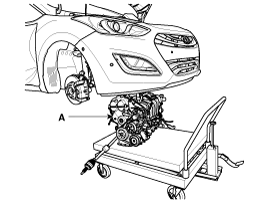
|
When remove the engine and transaxle
assembly, be careful not to damage any surrounding parts or
body
components. | |
Installation is in the
reverse order of removal.
Perform the following
:
| • |
Adjust the throttle
cable. |
| • |
Refill engine with engine
oil. |
| • |
Refill a transaxle with
fluid. |
| • |
Refill power steering
fluid. |
| • |
Refill a radiator and a reservoir tank with
engine coolant. |
| • |
Place a heater control knob on "HOT"
position. |
| • |
Clean battery posts and cable terminals and
assemble. |
| • |
Inspect for fuel leakage.
|
| - |
After assemble the fuel line, turn on the
ignition switch (do not operate the starter) so that the fuel pump
runs for approximately two seconds and fuel line pressurizes.
|
| - |
Repeat this operation two or three times, then
check for fuel leakage at any point in the fuel
line. |
| • |
Bleed air from the cooling
system. |
| - |
Start engine and let it run until it warms up.
(until the radiator fan operates 3 or 4
times.) |
| - |
Turn Off the engine. Check the level in the
radiator, add coolant if needed. This will allow trapped air to be
removed from the cooling
system. |